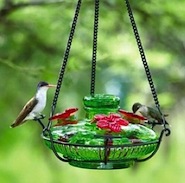Hummingbird Feeders and Audubon’s Newest Citizen Science Project

From Audubon:
A Rufous Hummingbird weighs less than a french fry and can fly 1,000 miles without food or rest. They may be mighty mites, but there’s one challenge they may not be able to overcome: us.
National Audubon Society scientists estimate that the global population of these amazing flyers has declined nearly 60 percent in the past three decades.
What’s pushing hummingbirds toward the brink? A deadly combination of habitat destruction, toxic pollution and the spread of invasive plants. And now a new threat may overshadow them all: ecological chaos caused by a warming climate. Warmer weather prompts earlier flowering of nectar-bearing plants that hummingbirds rely on during their epic migrations. If the flowers are gone before the birds arrive, they may starve.
The Rufous Hummingbird was common when we were kids. But it’s just one of dozens of familiar bird species headed for trouble.
Audubon has always been at the forefront of protecting birds and their habitats. And as threats have grown, so have the breadth and sophistication of our conservation strategies.
Hummingbirds at Home
This spring, Audubon united cyberspace with a century of citizen science experience to launch a high-tech tracking project called Hummingbirds at Home. Participants can download a mobile app or access a website to report sightings of hummingbirds nationwide. Using the data, our scientists will map conservation strategies to protect these birds’ future.
Hummingbirds at Home is just one of the 21st Century approaches we are taking to secure a future for birds and their habitat. We’re also using Big Data analytics to find hidden patterns in a century of Christmas Bird Count stats. We’re using social media to organize and rally support for bird-friendly laws. And we’re using the web to foster a new generation of bird-lovers who will carry on our conservation work.
Will our children and grandchildren grow up with the wonder of watching a hummingbird hover over the flowerbed or sip nectar from a backyard feeder?
With your help, they will. Please donate today and your gift will go twice as far to protect birds.
Help us save hummingbirds, other birds and their habitats with a generous summer donation to Audubon. And, from now until July 25, your donation will be matched dollar for dollar, up to a total of $200,000!
